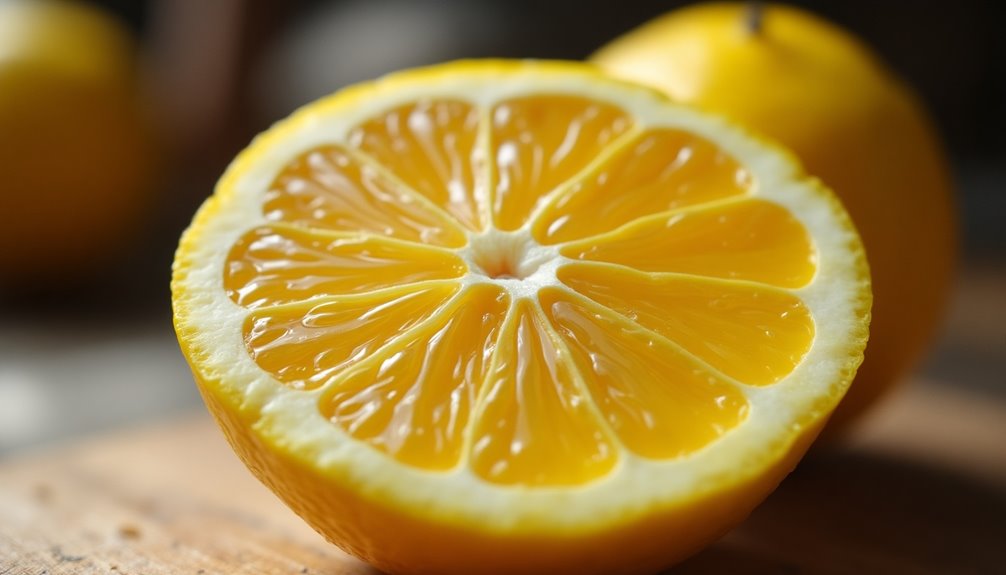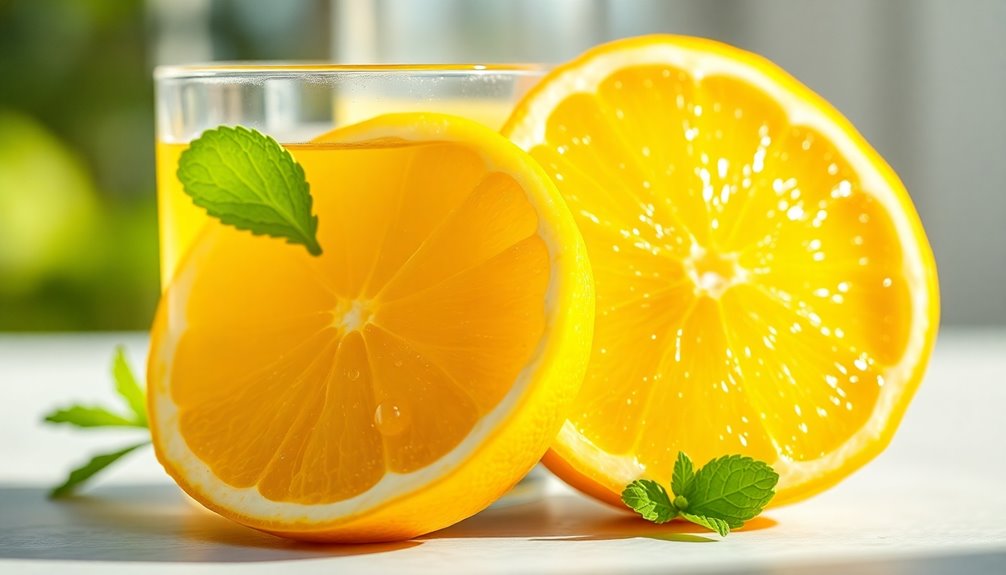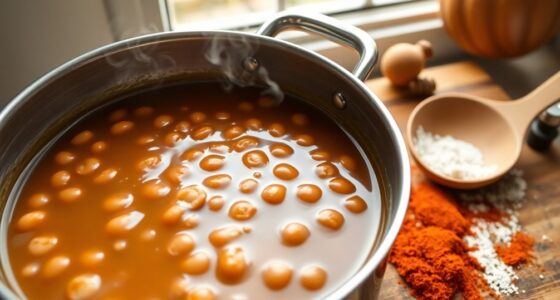The juice of half a lemon usually gives you about 1.5 to 2 tablespoons, depending on the lemon's size and ripeness. If you want to maximize juice extraction, try rolling the lemon on the countertop before cutting it. Ripe lemons typically yield more juice, so keep that in mind for your recipes. By understanding these tips, you can enhance your cooking and make the most of lemon's flavor. There's even more to discover about using lemons effectively!
Key Takeaways
- The juice of half a lemon typically equates to about 1.5 to 2 tablespoons of fresh lemon juice.
- A medium lemon yields approximately 1.5 tablespoons of juice, while larger lemons yield around 2 tablespoons.
- The actual yield may vary based on the size and ripeness of the lemon used.
- Rolling the lemon before cutting can maximize juice extraction, ensuring you get more from the fruit.
- Fresh lemon juice enhances flavor in recipes, making accurate measurements important for achieving desired taste.

When you're cooking or baking, the juice of half a lemon can be a game-changer. It adds that perfect zing to your dishes, enhancing flavors and brightening up your recipes. But how much is the juice of half a lemon, really? It all depends on the size of the lemon you're using. If you grab a medium lemon, you can typically expect to extract about 1.5 tablespoons of juice. On the other hand, if you opt for a larger lemon, you might get around 2 tablespoons of fresh lemon juice. Understanding these measurements can make a significant difference in the outcome of your culinary creations.
The juice yield can slightly vary based on the lemon's ripeness and freshness. A ripe lemon usually provides more juice, while a lemon that's past its prime might yield less. If you're following recipes that call for "juice of half a lemon," it's helpful to know that you can substitute with 1.5 to 2 tablespoons of fresh lemon juice from your chosen lemon. This way, you can confidently adjust your measurements and still achieve the desired taste and acidity in your dish.
To maximize juice extraction, you might want to roll the lemon on the countertop before cutting it. This simple technique helps break down the cells within the fruit, allowing for better juice yield. When you cut into the lemon afterward, you'll find that you can squeeze out every last drop, ensuring you get the most out of your citrus fruit.
Plus, don't forget about lemon zest! The zest adds another layer of flavor, and combining it with the juice can elevate your recipes even more.
If you frequently use lemons in your cooking, it's a good idea to keep a few on hand. Fresh lemons are versatile and can be incorporated into a wide variety of dishes. Whether you're making salad dressings, marinades, or desserts, the addition of lemon juice can enhance the flavors beautifully.
And if you've got a recipe that requires an exact measurement, knowing the expected juice yield from different lemon sizes can help you avoid any miscalculations.
Frequently Asked Questions
How Much Juice Is in 1/2 Lemon?
When you cut a lemon in half, you can expect to get around 1½ tablespoons of juice from a medium lemon and about 2 tablespoons from a large one.
However, the amount can vary based on the lemon's size and ripeness.
To maximize your yield, roll the lemon on the counter before cutting it. This technique can help you get the most juice possible, so don't skip it!
How Much Bottled Lemon Juice Equals Half a Lemon?
Imagine a sun-kissed lemon, its vibrant yellow skin glistening like a tiny sun.
When you're replacing the juice of half a lemon, you'll need about 1 tablespoon of bottled lemon juice. However, if you're using a larger lemon, aim for 2 tablespoons.
Just remember, bottled lemon juice carries a different flavor, like a shadow of its fresh counterpart. Always check the label for specific conversions, as brands may vary in strength.
Can I Substitute Bottled Lemon Juice for Fresh Lemon Juice?
Yes, you can substitute bottled lemon juice for fresh lemon juice, but be prepared for some flavor differences.
Bottled juice is often more concentrated and may contain preservatives, which can alter the taste of your dish. If you decide to use it, start with a smaller amount and adjust to taste.
However, whenever possible, you should opt for fresh lemon juice to achieve that bright, vibrant flavor that enhances your recipes.
How Many Tsp Are in Half a Lemon?
When you’re measuring juice from half a lemon, it usually yields about 4. 5 teaspoons if it’s a medium-sized lemon. If you’re wondering how much juice from lemon half is needed for your recipe, this amount is generally sufficient for salad dressings, marinades, or making a refreshing beverage. However, larger lemons can yield up to 6 teaspoons, while smaller ones might produce less than 3 teaspoons. It’s always a good idea to have an extra lemon on hand just in case you need a bit more juice to enhance the flavor of your dish.
If you've got a large lemon, you might get closer to 6 teaspoons.
Always keep in mind that the size and ripeness of the lemon can affect the juice yield.
If you need precision for your recipe, it's a good idea to measure the juice to ensure you get just what you need.
Conclusion
In the grand scheme of culinary delights, the juice of half a lemon is a tiny burst of sunshine that can transform an ordinary dish into a flavor explosion! Just a tablespoon or so holds the power to elevate your recipes to gourmet status, making your taste buds dance like they've just won the lottery. So, the next time you're squeezing that little citrus gem, remember: it's not just juice; it's a magic potion that awakens every flavor it touches!
Cindy thoroughly researches juicing trends, techniques, and recipes to provide readers with practical advice and inspiration. Her writing style is accessible, engaging, and designed to make complex concepts easy to understand. Cindy’s dedication to promoting the advantages of juicing shines through her work, empowering readers to make positive changes in their lives through the simple act of juicing.











